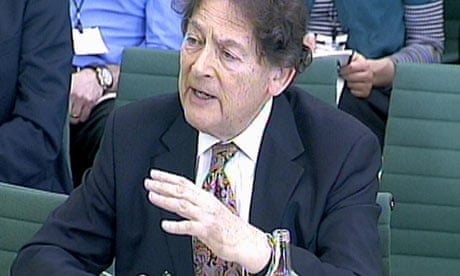Oh, for an end to the climate wars. Lord Lawson's sceptic thinktank has offered its take on whether the inquiries into the University of East Anglia (UEA) emails did their job adequately. But for all its sharp – and in many cases justified – rejoinders to the official inquiries, its report is likely to be ignored in some quarters for its brazen hypocrisy.
Here is the problem. Critics of the official inquiries have remorselessly attacked the fact that no out-and-out climate sceptics were on the inquiry teams. Now they have produced their own review of the reviews. But guess what. The author is a man whose views about "climategate" were well-known in advance. And none of the team put up by his sponsors, Lord Lawson's Global Warming Policy Foundation (GWPF), to review Andrew Montford's review of the reviews could be described as an outsider, let alone a sympathiser with the UEA's Climatic Research Unit (CRU). The £3,000 fee for the review came from GWPF's coffers, but the secretive organisation refuses to reveal who its backers are.
Of course the GWPF is entitled to do what it likes. But the backstory leaves its conclusion that "insufficient attention was taken with the choice of panel members to ensure balance and independence" ringing a little hollow.
The three inquiries conducted into the "climategate" affair were all badly flawed. One, by MPs, was rushed to get it done before the general election. Neither of the other two, both commissioned by the UEA itself, directly addressed the scientific judgment of the emailing climate scientists under scrutiny. A failing that could hardly have been better designed to ensure that nobody ended up in the stocks.
Whenever the inquiries turned up, evidence that CRU director, Phil Jones, or his colleagues might have abused their positions as peer reviewers of scientific papers criticising their own work, or papered over some cracks while drafting chapters for the Intergovernmental Panel on Climate Change (IPCC), the inquirers concluded that it was a matter of scientific judgment. And thus either outside their terms of reference, or something where the scientists themselves were entitled to the last word. Montford dissects this systemic failure well.
One of the most serious charges to emerge from "climategate" was that CRU scientists did back-door deals to include unpublished research in the last IPCC report, published in 2007. This subverted the supposedly open review process of the IPCC. And, when someone asked for the emails that would have exposed it, they hastily deleted them – a potential breach of freedom of information (FoI) law.
The Muir Russell inquiry said it found no evidence that the CRU scientists had done this. Observers were incredulous. The chronology seemed straightforward. British sceptic David Holland submitted an FoI request to the university asking for emails in which CRU scientists discussed their work for the IPCC. Two days later, Jones sent an email to colleagues asking them to delete emails relating to the behind-the-scenes work for IPCC. That email, as Montford points out, carried Holland's FoI number as its subject line.
How did Sir Muir miss this? In a development not covered by Montford, the university has since admitted, in correspondence with blogger Steve McIntyre, that it omitted the email from its list of FoI requests sent to Sir Muir. So Sir Muir seems to have been about the only person studying the affair not to have known about it.
This is all, we may hope, cock-up rather than conspiracy. But the university did itself no favours in its own response to Sir Muir last week, when it expressed its satisfaction that he had found no evidence of such culpable deletions. Advice to UEA: when in a hole, stop digging.
None of the inquiries have cleared the air. Maybe the scientists themselves can achieve it.
At several recent conferences discussing "climategate", I have heard a genuine responsiveness to the criticisms: a realisation that "groupthink" had led some scientists to become blind to the uncertainties inherent in their work; an understanding that they will have to share their data more swiftly, even with non-scientists; and a realisation that public trust in climate science will require a change of tone and a touch more humility on their part.
Anyone who doubts how far we have come should see this month's report of the InterAcademy Council into the workings of the IPCC. This breaks strongly with the old mantra that "one bad paragraph" should not undermine 3,000 pages. It too attacks groupthink. And it notes, for instance, how the IPCC has tended to "emphasise the negative impacts of climate change", many of which were "not supported sufficiently in the literature, not put into perspective or not expressed clearly".
I have no problem with Montford. His Bishop Hill website is not to everyone's taste, but he has landed some good blows here. Mainstream climate scientists need acerbic critics to keep them honest. And there are real signs of progress.
